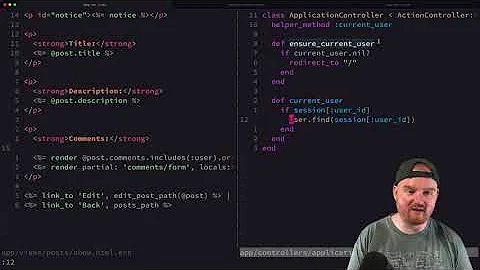Rails Caching DB Queries and Best Practices
Solution 1
With respect to the caching, a couple of minor points:
It's worth using slash for separation of object type and id, which is rails convention. Even better, ActiveRecord models provide the cacke_key instance method which will provide a unique identifier of table name and id, "cities/13" etc.
One minor correction to your after_save filter. Since you have the data on hand, you might as well write it back to the cache as opposed to delete it. That's saving you a single trip to the database ;)
def after_save Rails.cache.write(cache_key,self) end
As to the root of the question, if you're continuously pulling @user.city.name, there are two real choices:
- Denormalize the user's city name to the user row. @user.city_name (keep the city_id foreign key). This value should be written to at save time.
-or-
- Implement your User.fetch method to eager load the city. Only do this if the contents of the city row never change (i.e. name etc.), otherwise you can potentially open up a can of worms with respect to cache invalidation.
Personal opinion: Implement basic id based fetch methods (or use a plugin) to integrate with memcached, and denormalize the city name to the user's row.
I'm personally not a huge fan of cached model style plugins, I've never seen one that's saved a significant amount of development time that I haven't grown out of in a hurry.
If you're getting way too many database queries it's definitely worth checking out eager loading (through :include) if you haven't already. That should be the first step for reducing the quantity of database queries.
Solution 2
If you need to speed up sql queries on data that doesnt change much over time then you can use materialized views.
A matview stores the results of a query into a table-like structure of its own, from which the data can be queried. It is not possible to add or delete rows, but the rest of the time it behaves just like an actual table. Queries are faster, and the matview itself can be indexed.
At the time of this writing, matviews are natively available in Oracle DB, PostgreSQL, Sybase, IBM DB2, and Microsoft SQL Server. MySQL doesn’t provide native support for matviews, unfortunately, but there are open source alternatives to it.
Here is some good articles on how to use matviews in Rails
sitepoint.com/speed-up-with-materialized-views-on-postgresql-and-rails
hashrocket.com/materialized-view-strategies-using-postgresql
Related videos on Youtube
John Kopanas
Updated on April 19, 2022Comments
-
John Kopanas about 2 years
The DB load on my site is getting really high so it is time for me to cache common queries that are being called 1000s of times an hour where the results are not changing. So for instance on my city model I do the following:
def self.fetch(id) Rails.cache.fetch("city_#{id}") { City.find(id) } end def after_save Rails.cache.delete("city_#{self.id}") end def after_destroy Rails.cache.delete("city_#{self.id}") endSo now when I can City.find(1) the first time I hit the DB but the next 1000 times I get the result from memory. Great. But most of the calls to city are not City.find(1) but @user.city.name where Rails does not use the fetch but queries the DB again... which makes sense but not exactly what I want it to do.
I can do City.find(@user.city_id) but that is ugly.
So my question to you guys. What are the smart people doing? What is the right way to do this?
-
John Kopanas over 15 yearsWhat is the benefit of memoization over Rails.cache and how does that solve the problem of User.city.name where Rails does a find on City instead of using cached data?
-
RonS over 15 yearsmemoization just wraps the Rails.cache. I do not think it will help model associations like you are looking for.
-
Michael over 15 yearsMemoization will only store the result on a per server process basis and does not invalidate, as such it's relatively inappropriate for your situation and isn't intended to be used in this way.
-
Michael over 15 yearsMemoization doesn't wrap the Rails cache. Rails.cache is typically a cache store shared between processes (such that you actually obtain caching benefits). Memoization only occurs within the current process.
-
 Eric H. about 9 yearsEG
Eric H. about 9 yearsEGUser.where(id: 3).includes(:city).first. Under-appreciated isjoin-mergefor many to many to many relationships. EGCity.joins(:restaurants).merge(user.favorite_restaurants), will return all cities where a user has many favorite restaurants, and restaurants have many cities. Check includes and joins. Definitely worthwhile to learn how to cut down calls with powerful queries rather than going through the pains of caching.








